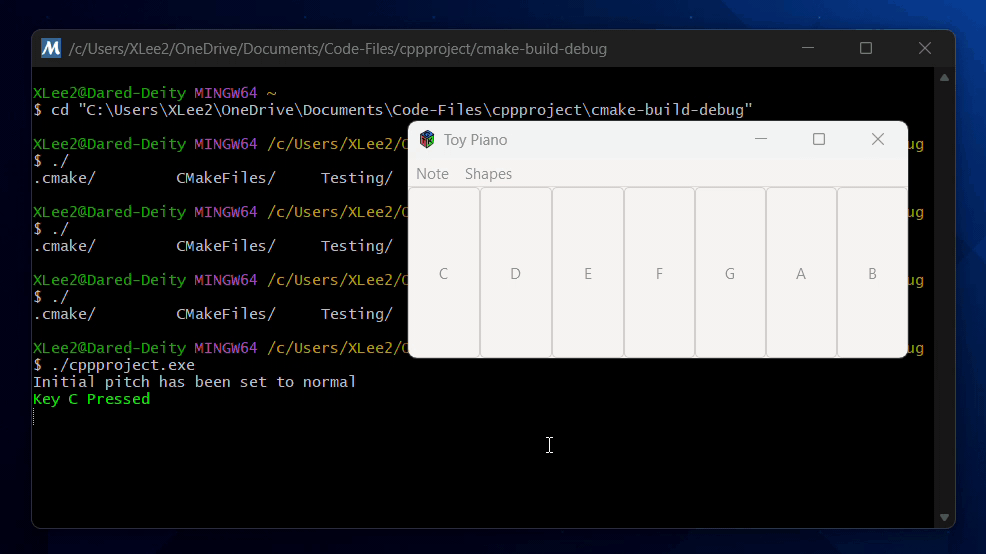- About the Program
- Running the Application
- via building the source files
- via running the .exe file
- Parts of the application
- Oddities
This is meant to be a simple program to demonstrate my abilities to use
C++ and the GTK UI framework to display a UI. It is a simple small keyboard that displays 7 buttons,
each of which plays a *.wav audio file when pressed. Each key has a letter on it corresponding to the note to play.
The pitch of the notes that are played can be altered through the Note button in the menubar.
The program was also used as a final project for my C++ class, specifically CS 361.
As such, some additional features were added in order to hit what was required, such as the Shapes button in the menubar.
While these do not have much to do with a keyboard, they were added for that reason, and can be removed if desired.
In order to run the application, it requires a Windows installation with
MSYS2 MINGW64installed. For either 2.1 or 2.2, the following
must be downloaded and prepped in the MSYS2 MINGW64 environment.
To prep you must open the MSYS2 MINGW64terminal and run the following commands:
pacman -S mingw-w64-x86_64-gtk4
pacman -S mingw-w64-x86_64-toolchain base-devel- Download the source files from where ever you got them from
- Unzip the source files
- The files must be set as follows
src ├── main.cpp ├── shapes.h ├── audio.h └── pianokeys └── *Holds audio files in .wav* - Then the main.cpp file can be ran from IDE of choice
- You must set up the environment to use the
MSYS2 MINGW64environment- In CLion you can do this by
- Changing the environment in the settings by going to
File > Settings > Build, Execution, Deployment > Toolchains - Then you can add a new toolchain by clicking the
+button - Then you can select the
MSYS2 MINGW64by changing Toolset to point toC:\msys64\mingw64 - CLion will automatically detect the build tool, C compiler, and C++ compiler at this point
- Then you can click
OKand thenApply - Make sure the toolchain is at the top of the list!
- Changing the environment in the settings by going to
- In CLion you can do this by
- You must set up the environment to use the
- Download the files and extract them to a folder.
- Open the
MSYS2 MINGW64terminal and navigate to the folder.- ex:
cd C:\Users\user\MyCppProgram
- ex:
- Run the program from the directory by doing:
{path to the folder}/cppproject.exeThe main application uses GTK4 to create the GUI. The GUI is made up of 3 main parts.
- The main window
- The piano keys
- A series of buttons that play a note when clicked
- The menubar
- A menu bar that has a few options
Note- Displays a menu that lets you change note pitchesNote > * Pitch- Changes the note pitch to the number (*) selectedShapes- Displays a menu that will draw a shape in consoleShapes > Diamond- Draws a Diamond in console using * as the characterShapes > Triangle- Draws a right triangle using a recursive function, using * as the character
- A menu bar that has a few options
- This is mainly to hit a pre-requisite for the class, as it requires shapes in console drawn, using recursive or nested functions.
- Make sure the audio files are in the structure as shown in 2.1. It is also required that you are running Windows, if you do not, then there is a chance audio will not play without changing the source code.
Why does Gtk-CRITICAL **: xx:xx:xx.xxx: gtk_main_quit: assertion 'main_loops != NULL' failed show up in the console?
- This is because clicking the
Xbutton is undefined in the program. GTK will try to insinuate its to close the program, and thus will throw the error. This is not a problem, and can be ignored.
- At this point in time, the program must be ran in the environment. While it is possible to generate a exe file that will not require the environment, it is not currently set up to do so. This would require alot more time out of my schedule that I do not have at this time. This can, however, be done later or by a user if wanted.
